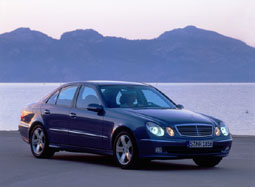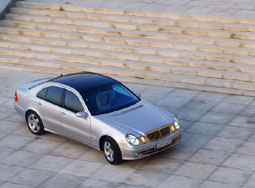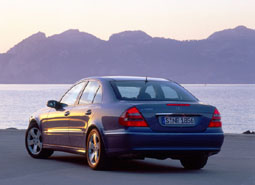|
|
|
|
|
 |

|
|
|

|
 |

|
|
|
 |
|

|
The Mercedes-Benz E-Class cars have been re-engineered
from the axles up for the 2003 model year. Mercedes has
redefined its traditional best seller with loads of new
technology, a sensuously athletic new look and more youthful,
vigorous driving dynamics. The E-Class has never been the
biggest, fastest nor most technically sophisticated of the Mercedes-Benz cars, but
it is surely the most recognizable Mercedes in the world.
The company's mid-line E-Class luxury sedan is a fixture
from Burbank to Berlin to Baghdad.
technically sophisticated of the Mercedes-Benz cars, but
it is surely the most recognizable Mercedes in the world.
The company's mid-line E-Class luxury sedan is a fixture
from Burbank to Berlin to Baghdad.
The E-Class was knocked from the top of Mercedes' U.S. sales
chart in 2001 for the first time ever, replaced by the compact
C-Class sedan and coupe. The switch, more than likely, is
an anomaly. Since World War II, the E-Class has accounted
for nearly half of Mercedes' worldwide sales. Without major
updates since 1995, the outgoing E-Class might have grown
stale in the buying public's eye, and it still averaged
50,000 sales annually for the past five years.
The importance of the E-Class in Mercedes' lineup brings
an important benefit for consumers: The company spent four
full years and nearly $2 billion developing the all-new
2003 model. By any measure, that's serious investment. Clearly,
the company in Stuttgart is flexing its muscles for a real
show of force. It appears BMW and Audi have cause for concern
here.
|
|
|

|
 |
 |
 |
|
|

|
 |

|
|

|
The Mercedes-Benz E-Class comes in two variants, the
more popular V6-powered E320 and the V8-powered E500. E320
($46,950) comes loaded with the standard equipment buyers
expect in this class, starting with fully automatic dual-zone
climate control, a power tilt and telescoping steering wheel,
10-way power front seats, real walnut trim, a 10-speaker stereo, power windows
with one-touch operation up and down, auto-dimming mirrors
and rain-sensing windshield wipers.
seats, real walnut trim, a 10-speaker stereo, power windows
with one-touch operation up and down, auto-dimming mirrors
and rain-sensing windshield wipers.
E500 ($54,850) has been gaining sales ground on the E320
in recent years. For 2003, the V8's engine displacement
has increased from 4.3 liters to 5.0 liters (hence the name
change from E430 to E500), with a corresponding increase
of 29 horsepower. Besides more power, the E500 adds standard
equipment, including four-zone climate control with separate
temperature adjustments for both sides of the cabin, front
and rear, and the new Airmatic Dual Control suspension.
Our test car, an E500, came with several options, starting
with the E-Class sport package (high-intensity headlights,
dark-tinted glass and aggressive looking body cladding).
It also had heated seats and steering wheel, a hands-free
telephone package, the see-through, all-glass Panorama sunroof
and a 420-watt Harman Kardon stereo upgrade with six-disc,
in-dash CD changer. These extras brought the sticker to $62,405.
the sticker to $62,405.
All the options on our E500 are also available on the E320,
and there are dozens more offered on both cars. Popular
choices include radar-managed Distronic adaptive cruise
control, which maintains a set distance from cars ahead,
and the Keyless Go system, which can unlock the doors and
start the car by touching the door handle and gear selector.
Parktronic obstacle warning helps with parking and enhances
safety by alerting the driver to objects behind the car.
Also available: GPS navigation, a DVD-capable in-dash information
management system; voice operation for the phone, audio
controls and navigation system; ventilated massaging seats;
and solar-powered interior ventilation. This is a luxury
car, so there's even a power trunk closer.
|

|
|

|
books |
sponsored links |
By the first of the year, Mercedes will launch the mighty
E55, performance-tuned by subsidiary AMG with a supercharged
V8 producing 493 horsepower (and that's no typo). Expect
a premium of at least $10,000 over the E500. The
E320 wagon continues, though it will be built from the old
E-Class sedan at least through 2003. A wagon based on the
new-generation E-Class should arrive by 2004.
|
|

|
|
|

|
|

|
 |
 |
 |
|
|

|
 |

|
|

|
The new Mercedes E-Class is slightly larger than its
predecessor. It's nearly an inch longer in wheelbase and
overall length and it's a half-inch taller in overall height.
Mercedes' mid-size sedan is also 50-100 pounds heavier,
depending on the model. Yet the weight increase is hardly
significant, given more standard equipment and improved
crash protection. The 2003 E-Class is the first Mercedes
to use aluminum body components extensively, starting with
the hood, front fenders, trunk lid and front subframe.
fenders, trunk lid and front subframe.
You won't notice any of that when you circle the E and
then step back for a critical inspection. What you'll notice
is how handsome this machine is. Mercedes-Benz has put a
new emphasis on styling of late, and the E-Class may be
the best example yet. The E-Class looks like a smaller
S-Class, only better. The four-headlight theme introduced
on the previous E-Class, now the standard at Mercedes, has
been refined to a more sophisticated level. The new E's
front end seems lower, and it's more steeply raked. Every
line from one end of the car to the other flows and blends.
The new E-class is more fluid and graceful than the old,
which seems doughty in comparison. The design produces an
impressive 0.27 coefficient of drag (great for minimizing
wind noise and maximizing fuel economy), but the look is
the thing. It's stylish, for certain.
Our E500 wore a glossy, non-metallic deep gray topcoat,
very German, very cool. The sport package is distinguished
by its dark glass, aggressive-looking wheels and very low
ride height for a standard sedan. In a week that included
visits to restaurants, a 30-screen movie theater and open
house at the local junior high, we heard the word gorgeous
five or six times from passersby.
|
|

|
|
|

|
|

|

|
|
|
|
|
